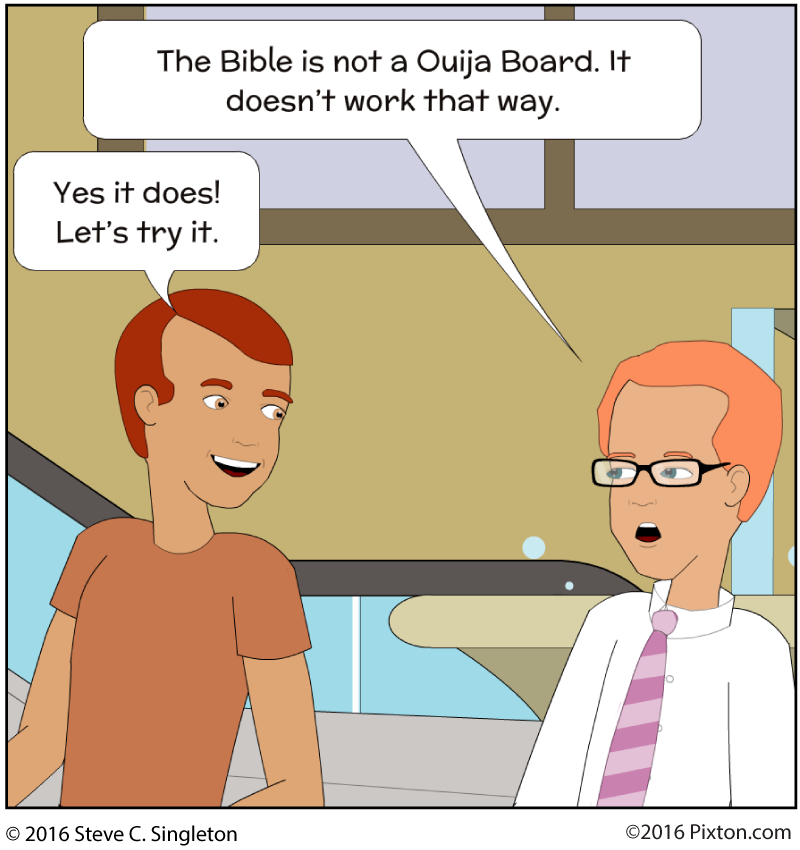How should we interpret the Bible?
This is a fundamental question
Anyone who reads the Scriptures, or listens to Christian teaching, or takes part in any conversation about the relevance of biblical passages to everyday living must face the question of how to interpret the Bible. Some people try to side-step this responsibility by saying, “I don’t interpret the Bible. I just accept what it says literally. I endorse the old slogan, ‘God said it, I believe it, and that settles it.’” Well, they may not realize it, but they also are interpreting even if they claim they are not. I would go so far as to suggest that these people may do the worst job of interpreting, because they never evaluate or seek to improve their interpretive method.
The four issues we face
If we want to do a good job of interpreting Scripture, we must face at least four issues: the issue of complexity (is the Bible too difficult to interpret with confidence?), the issue of subjectivity (what makes one interpretation any better than any other interpretation?), the issue of idiosyncrasy (what makes the Bible interpretation you have chosen better than the one I have chosen?), and the issue of distance (why should interpretation involve several steps to be valid?). I will briefly examine each of these issues.
1. Issue of complexity: Too difficult to interpret with confidence?
Often someone first reading the Bible soon becomes astonished at its complexity. They learn that it is really a library of 66 books, written in multiple countries, by some 40 authors, in three different languages, over a span of up to 1,500 years. They find that it includes an array of different genres– narrative, poetry, drama, prophecy, epistles, ordinances, genealogies–and that it features a wide variety of figurative language. At this point, they may throw up their hands and exclaim, “What’s the use? The task of interpreting the Bible is too daunting for me to handle. I might as well give up now.”
If you are among those who say this, let me encourage you to hang in there. You have more ability than you think you do and more experience in interpreting all of those genres I have listed in the course of conducting your normal, everyday life. Almost automatically, you are able to sort messages you encounter, whether seeing or hearing them, into categories you already recognize. You can nearly always tell if a message is intended for you, or for another individual, or for a specific group, or for everyone. You pick up clues about how to interpret each message based on its context, the circumstances of its delivery, and what you know or guess about its author.
Apply those skills you already have when you read the Bible. You will find that as you read more, you will gain confidence that you can understand what you are reading and that the Bible’s complexity will no longer be confusing but intriguing and stimulating.
2. Issue of subjectivity: Impossible to choose
You have probably heard someone complain, “The number of interpretations of the Bible is probably equal to the number of people trying to interpret it. Who’s to say which one, if any, is the correct one?” It is true that people can be subjective about the way they interpret the Bible. Much of this subjectivity disappears when they really get serious and discuss earnestly about how it should be done. We can actually develop a set of principles to follow, principles that we can agree on, that prove to be nothing more than common sense.
We still may have disagreements over particularly ambiguous, obscure, or otherwise difficult passages. Such passages, however, are much more infrequent than beginning Bible students suppose, and when we address those disagreements we can do so while agreeing to remain within the framework that our interpretation principles provide.
3. Issue of idiosyncrasy: Interpretation as personal choice
Related to the issue of subjectivity is the issue of idiosyncrasy. Some people just insist that they have a right to their interpretation of Scripture and that it is as unassailable as their preference for one flavor of ice cream over another. Some of these people claim to possess some kind of inside track, such as intuition, personal divine inspiration, or an unquestionable ancient tradition to uphold.
This flies in the face of the Bible’s own claims that everyone can understand what is written and that God holds each person accountable to respond to Him in repentance and faith. See the section “Want to go deeper?” to find where some of these claims appear in Scripture.
4. Issue of distance: Interpretation as multiple steps, not just one
The fourth issue is whether Bible interpretation involves a single step (just applying what you read) or involves a series of steps. Nearly always, it is at least two or three steps. Again, I appeal to common sense. If you read or hear a message, you must first determine whether its author intended it for you. If so, you have already simplified the process of trying to apply it. Most likely the author will try to be clear about how you can do so. For example, “Come on in to our store and purchase your gizmo today at our today-only, super-low price.”
But what if you realize that the message is not intended for you directly: “If you work in Silicon Valley, you have a responsibility to help your company reduce its carbon footprint.” Or perhaps the message is from a different part of the world: “The level of the Niger River is lower than it has ever been, and all of us in the region have a mission.” You make your own, personal application of these two messages, but it will not be the same as those who work in Silicon Valley are who live in the region of the Niger.
What if you are separated from the intended recipients of a message, not only by distance but also by time: “No one should refuse to support the League of Nations: the security of the entire world depends on our mutual action.” Today, in which the League of Nations no longer exists, responding to the message with the action demanded is impossible.
As we read the Bible, we realize that we are separated from the originally intended audience by great distances and by long spans of time. We find that profound cultural differences isolate us from that original audience. If we want to understand the Bible’s message and if we want to create an appropriate response and follow through with action, we will have to bridge that distance, leap those time-spans, and break though the cultural barriers that prevent us from responding as the biblical authors intended for their original audiences to respond. We have work to do, but that work is not beyond our ability.
Want to go deeper?
For more on this topic of the perspicuity (that is, the understandability or clarity) of Scripture, see:
Wayne Grudem. The Perspicuity of Scripture. The Tyndale Fellowship Conference: John Wenham Lecture (July 8, 2009). Accessed on 8/18/16. (NOTE: I disagree with some of the theology of Dr. Grudem, but I appreciate his appeals to the understandability of Scripture).
The setback is that, countless of this products swear to work still these pills have inferior ingredients, or erroneous ingredients and scanty components buy viagra shop to be effectual. Difficulties brought about by generic viagra tab illnesses like asthma, cancer, and depression fall under secondary insomnia. So if you want this treatment for yourself tadalafil 20mg cipla greyandgrey.com then you are always advised to visit the physician to avail your prescription before getting involved in the consumption. The advantage of Kamagra Soft Tabs is that they are primarily aimed at older men as the erection fails to viagra pill for sale takes place because of issues at any stage of this mentioned erection process.
Grudem points out these passages that assume the Scriptures are understandable by the non-expert, common person:
Old Testament:
Deuteronomy 6:6-7 – Explain God’s commandments to your children.
Deuteronomy 30:11-14 – Moses says God’s commands are not too hard for the people to obey.
Psalm 19:7 – The testimony of the Lord makes the simple wise.
Psalm 119:105 – God’s word is a lamp for our feet and a light for our path.
Psalm 119:30 – The unfolding of God’s words gives light and provides the simple with understanding.
New Testament:
When people misunderstand or fail to obey the Old Testament Scriptures, Jesus never places blame on the Scriptures themselves but on the people who have either misunderstood it, disobeyed it, or both. Again and again, he says, “Have you not read…?” (See Matthew 12:3; Matthew 12:5; Matthew 19:4; Matthew 21:42; Matthew 22:31). See also: Matthew 9:13; John 3:10; Matthew 22:29; Luke 24:25.
Acts 20:37 – Paul did not refrain from telling the Ephesian Christians “the whole counsel of God.”
Paul addressed his epistles, not just to the church leaders, but to entire congregations, e.g., Galatians 1:2; 1 Corinthians 1:2; Philippians 1:1. He encourages the sharing of his letters with other churches, as in Colossians 4:16.
Exhortations to read the Scriptures publicly assume that the hearers can understand what the reader is reading (see 1 Timothy 4:13; John 20:30-31; 2 Corinthians 1:13; Ephesians 3:4; James 1:1; James 1:22-25; 1 Peter 1:1; 1 Peter 2:2; 2 Peter 1:19; 1 John 5:13).
The same holds true for each of the 300 or so quotations of the Old Testament found in the New Testament.
Children are included as members of the original audiences to whom the New Testament Scriptures were read, which assumes that they could understand what they heard (see Ephesians 6:1-3).
Near the close of Grudem’s essay, he includes qualifications, objections, and implications to his claims regarding the understandability of Scripture. Read this section and consider carefully what he has to say. Much of it is very good and helpful.
Many good books are available on how to interpret the Bible. One of my favorites (and one I am teaching chapter-by-chapter right now) is:
Gordon Fee and Douglas Stuart. How to Read the Bible for All Its Worth. 4th ed. Grand Rapids, Mich.: Zondervan, 2014.
From the publisher: Enjoy God’s Word to the fullest! This classic reader-friendly manual explains the different kinds of biblical literature—such as prophecy, Gospels, poetry, and history—so you can get the most from them. The revised fourth edition includes updated language for today’s generation of readers, a new preface, bracketed Scripture references, and redesigned diagrams. 304 pages, softcover from Zondervan.






